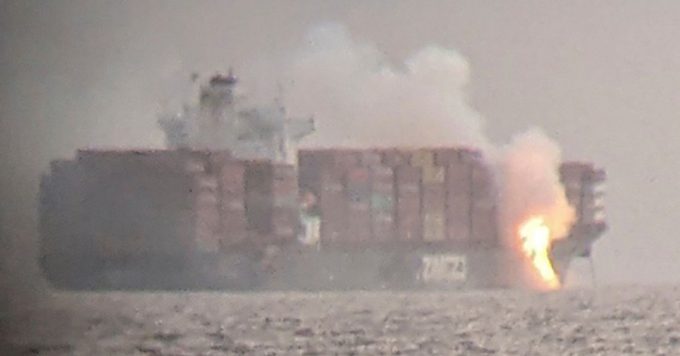Cargo Integrity Group reveals the most dangerous cargo found in containers
A list of 15 of the most dangerous cargo types commonly carried in containers has ...
TFII: SOLID AS USUALMAERSK: WEAKENINGF: FALLING OFF A CLIFFAAPL: 'BOTTLENECK IN MAINLAND CHINA'AAPL: CHINA TRENDSDHL: GROWTH CAPEXR: ANOTHER SOLID DELIVERYMFT: HERE COMES THE FALLDSV: LOOK AT SCHENKER PERFORMANCEUPS: A WAVE OF DOWNGRADES DSV: BARGAIN BINKNX: EARNINGS OUTODFL: RISING AND FALLING AND THEN RISING
TFII: SOLID AS USUALMAERSK: WEAKENINGF: FALLING OFF A CLIFFAAPL: 'BOTTLENECK IN MAINLAND CHINA'AAPL: CHINA TRENDSDHL: GROWTH CAPEXR: ANOTHER SOLID DELIVERYMFT: HERE COMES THE FALLDSV: LOOK AT SCHENKER PERFORMANCEUPS: A WAVE OF DOWNGRADES DSV: BARGAIN BINKNX: EARNINGS OUTODFL: RISING AND FALLING AND THEN RISING

The increasing prevalence of lithium-ion (Li-Ion) batteries being carried on containerships amid rising misdeclarations is a major concern for marine insurers, experts say.
According to a recent Allianz Global Corporate & Specialty (AGCS) report, misdeclared cargo has been implicated in a number of near-miss incidents recently, with false declarations including labelling them as ‘computer parts’.
In one case, the US Coast Guard reported a fire produced temperatures “hot enough to create a hole through the metal container’s structure”.
Battery fires are complex enough that land-based fire crews are having to introduce new, and sometimes experimental, measures to fight them.
Unlike normal fires, they can be starved of oxygen and continue to burn, and trying to fight battery fires with water can be unsuccessful.
The best way to extinguish them is by cooling down the individual cells.
But experts say ships’ onboard firefighting capabilities, especially on large vessels, are insufficient to tackle even ordinary fires, in many cases.
“There are more fires emerging from misdeclared cargoes of batteries confirmed as the source,” a representative of marine insurers told The Loadstar. “So it is not speculation to say the problem is increasing.
“There is probably no limit to the size of ships, so long as the factors to manage risk are proportionately secure. But they are not. Firefighting systems are limited in terms of reaching high up. The number of crew on board is limited – lean manning has become the accepted model of ship operations.”
The implications are bad for car-carriers as well, with increasing numbers of electric cars being transported. It is has not been determined whether the presence of Li-Ion battery-powered cars was the cause of the fire on Felicity Ace, but authorities are agreed that it was almost certainly an exacerbating factor.
“Lithium-ion batteries are a known issue for the shipping industry and the wider logistics industry, where there have been a number of near-misses in ports and during transport,” said Régis Broudin, global head of marine claims at AGCS, in the report. “Batteries are not only a potential cause of fire, they also aggravate the problem, as battery fires are very difficult to extinguish and have the potential to reignite, days or weeks later.”
The TT Club has urged supply chain stakeholders to ensure they know who the shipper is.
Comment on this article
George Kerchner
May 19, 2022 at 3:21 pmThis statement is incorrect and you are providing inaccurate information to emergency responders: “…trying to fight battery fires with water is often unsuccessful or even makes things worse, because lithium reacts with water to form lithium hydroxide and flammable hydrogen gas.”
Please have someone immediately remove this from the article. Thanks.
Alex Lennane
May 19, 2022 at 3:38 pmPlease let us know what you believe is inaccurate, although I have made changes to the text.
Alex Lennane
May 19, 2022 at 3:38 pmPlease let us know what you believe is inaccurate, although I have made changes to the text.